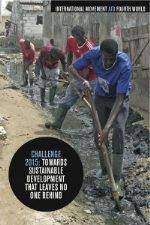Published on Fri, 2015-02-20 15:48
On February 18th a mid-day side event: “Robust and Measurable SDGs: Launch of report on scientific review of targets for the Sustainable Development Goals-the science perspective” was organized by the International Council for Science (ICSU) in partnership with the International Social Science Council (ISSC). The authors included forty-one people from the natural and social sciences in 21 countries and the event hosted a platform of 5 women contributors from different parts of the world presenting their particular angles on the document. The 17 Sustainable Development Goals (SDGs) and their 169 targets were reviewed and the report focuses on a variety of issues ranging from the problem with targets, their double edged nature, the integration of goals and implementability as well as measurability and their links to appropriate country situations. It found that 29% of targets were well defined, that 54% needed more work, while 17% were weak or non essential. |
Published on Fri, 2015-02-20 08:36
Jean Letitia Saldanha (CIDSE), participated in the a side-event by the Permanent Mission of Brazil to the UN, CIDSE and Social Watch on Thursday, January 29, 2015 in the UN Conference Building, New York. Dealing with responsibilities in a financing sustainable development context, this event generated discussion on conceptual challenges such as an evenhanded approach to the three pillars of sustainable development, adapting a framework like the Financing for Development process to the universal agenda of the Sustainable Development Goals without denaturalizing and decontextualizing it and how to incorporate important principles agreed at the UN Conference on Sustainable Development. |
Published on Thu, 2015-02-19 14:19
Feminist and women’s organizations from the global south have conceived the United Nations as a critical space for recognizing and advancing progressive policies towards the realization of women’s human rights and alternative development frameworks. Twenty years ago, the Beijing Declaration and Platform for Action recognized the impact of globalization trends, structural adjustment programs and privatization in women’s human rights and proposed measures that government should implement in order to revert these negative impacts. Among the recommendations, there was a strong recognition of the need to reform macroeconomic policies and development strategies to address gender inequality. Governments agreed to ensure that all corporations, the private sector, specially transnational corporations, “comply with national laws and codes, social security regulations, applicable international agreements, instruments and conventions, including those related to the environment, and other relevant laws, (para 165, l)”. Besides, new ways of generating additional public financial resources to tackle inequalities issues were considered, for instance, through the reduction “of excessive military expenditures” (para 143, b). Even if the Beijing Platform for Action (BPfA) was approved by governments in the context of the Washington Consensus, it has been a tool at the national and regional levels to promote policy change towards gender justice. |
Published on Thu, 2015-02-19 14:14
The social contracts of the 20th century face myriad challenges today: economic, financial and ecological crises; growing uncertainty; backlash against human rights and social justice. Civil society, grassroots organizations and social movements are calling for new social contracts, challenging the underlying power relationships and the intersections between them. At this panel discussion, key speaker Gita Sen, Valeria Esquivel from UNRISD and Roberto Bissio, Coordinator of Social Watch talk about the role of feminist movements in the remaking of social contracts. They will help untangle some of the complex power relationships that need to be addressed, if new social contracts are to fulfil the promise of human rights and gender justice. |
Published on Wed, 2015-02-18 14:19
International Movement ATD Fourth World presents the result of their participatory research on the Millennium Development Goals, Challenge 2015: Towards Sustainable Development that Leaves No One Behind, that brings the voices of people in poverty to the sustainable development debate. The result of years of participatory research with over 2,000 participants from over 20 countries, a majority of whom came from a background of poverty or extreme poverty, this report brings a unique voice to the global debate on international development. |
SUSCRIBE TO OUR NEWSLETTER







